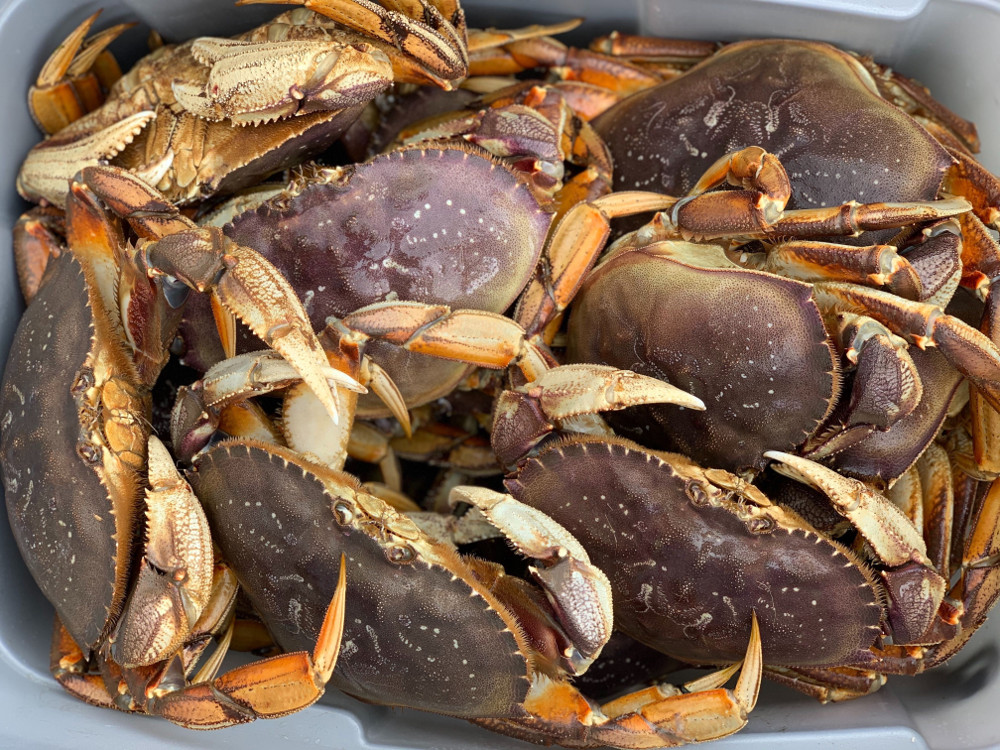
Alaska’s Board of Fisheries this week voted to close some parts of Southeast Alaska to Dungeness crabbing for the commercial fleet and sport fishermen. Board members backed proposals from area residents seeking to increase their subsistence catch in these areas.
As they have in other board cycles Southeast residents submitted proposals seeking closed areas near their communities for both commercial and sport Dungeness crabbing.
Kurt Whitehead is on Fish and Game advisory committees for Klawock and eastern Prince of Wales Island, which proposed some of those closures. For one proposal around Klawock, he explained residents wanted to ensure they could catch crab for subsistence and personal use close to town.
“But yeah this is a real need for the community of Klawock, economically depressed area, small boats,” Whitehead said. “They just wanted to push the commercial operators out just a short ways.”
Whitehead explained local residents in that community and others on the eastern side of the island felt like they could no longer catch Dungeness due to commercial fleet or out of state sport anglers. They report local areas where crab are scarce because of that competition and predation from sea otters.
The Alaska Department of Fish and Game opposed closing areas and said there is no conservation concern with Dungeness crab. The commercial fleet had its second highest harvest on record in 2020.
Board member Israel Payton of Wasilla said he generally supported closures like this one around a community.
“I understand, I grew up in a rural community and I grew up competing with resources as a local stakeholder with out of state and out of area, out of local residents coming in competing with that, so I understand why communities like a little sanctuary around their area to go harvest,” Payton said. “Subsistence is about harvesting close to your domicile, that’s what it’s all about, to have a sanctuary near where you live.”
The proposal for Klawock was originally drafted to close the area to the commercial fleet and non-resident sport fishermen. But the board removed the words non-resident on the urging of the Department of Law’s Aaron Peterson.
“If you were to say we’re just going to allocate everything away from any non-resident fishery, the department of law would have serious concerns with that,” Peterson said.
It was a unanimous 5-0 vote to close both commercial and sport crabbing in an area around Klawock. And while they removed the words non-resident, that change leaves that area open to Alaskans only under subsistence or personal use regulations. Board member John Jensen did not deliberate or vote on the crab proposals, because of a conflict of interest.
There are 17 areas already closed to commercial fishing in the region. Commercial fishing industry groups opposed more and backed proposals to reduce some of those exclusion zones.
Some of the areas have designations for subsistence use while others don’t and the board ending up supporting some subsistence sanctuaries but not others.
The board voted down new commercial closures in Coffman Cove (3-2 vote with Gerad Godfrey of Eagle River and McKenzie Mitchell of Fairbanks voting no) and Kasaan Bay (4-1 vote with only Payton voting yes), also on Prince of Wales Island. But they approved new prohibited zones for the commercial fleet around Whale Pass and Hydaburg (again 4-1 with Mitchell a no).
“I guess I’m not going to be in support of these proposals, I think that there’s an abundance,” said Mitchell. “For me the arguments presented by the proposer were kind of uncompelling because there was talk about the sea otter population which doesn’t connect the dots for me for this issue. There was talk about, I quote, fake residents, which by shutting it down to the sport fish and commercial fishery if they’re residents they can still prosecute in subsistence and personal use fisheries. So I’m just having a hard time connecting the dots on this argument.”
They voted against reducing a commercial closure zone in Tenakee Inlet (3-2 with board chair Mӓrit Carlson-Van Dort of Anchorage and Payton voting no.) And they voted against wiping a commercial closure near Elfin Cove off the books. (The vote was 4-1 with only Gerad Godfrey in favor).
The changes were’t just for commercial crabbers. The board supported closures of sport crabbing around Coffman Cove and Whale Pass (4-1 with Mitchell a no).
Board chair Carlson-Van Dort explained her thinking on one sport crabbing change.
“My intent would be to provide that opportunity for subsistence and personal use for Alaskan residents and I think that that’s what the intent of the proposal was,” she said.
During deliberations ADFG sportfish division director Dave Rutz thought many more communities could also be seeking closed areas.
“You know it could be a slippery slope starting to close areas to sport fishing when there are that many communities because there’s a lot of people out there that are NIMBYs (Not In My Back Yard), they don’t like people in their back yard. I just want to mention that,” Rutz said.
Board members were unanimous in voting down a longer commercial season for Dungeness in the wintertime in Sitka Sound. The board took no action on expanding a commercial fishery summer closure for Dungeness in Sitka Sound. That was after hearing that the proposer, the Sitka advisory committee, had reversed course and no longer supported it.









